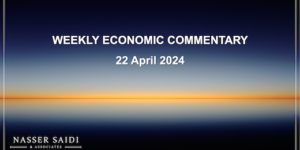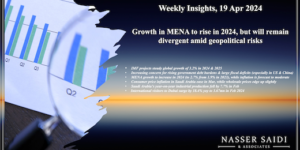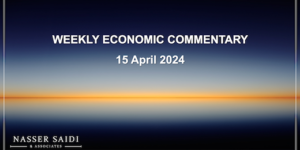Stock markets rose in the anticipation of the announced ECB commitment to support the weakling countries in the Eurozone and continued their rally after the announcement. In particular banks in Europe benefitted from lower spreads which boost their assets. In Asia, both Chinese and Indian markets had a good week, while in the region, Egypt and Oman indices were up and Tadawul in Saudi Arabia rose the most in two weeks. The euro posted the biggest weekly gain against the dollar since June as speculation was rife about new Fed Q3. Gold prices rose to the highest since Feb while oil prices posted small weekly losses, after five straight weekly gains.
- Non farm payrolls increased by a paltry 96,000 in August against expectation of 130-150K. Furthermore the numbers were probably inflated by a few temporary factors as the auto industry did not shut down as typical in July. Despite the weak numbers, reported unemployment rate declined to 8.1%, a discouraged worker effect.
- The ISM manufacturing index came at 49.6 in August, almost similar to July’s 49.8. The index came in below our expectations and has been below its neutral threshold of 50 for three consecutive months
- The ISM non-manufacturing index rose 1.1 points to 53.7 in August stronger than expected. Services are performing slightly better in Q2 with the employment index also gaining traction, despite a dip in new orders.
- Non-farm business productivity rose 2.2% qoq (ann. sa) in Q2, revised sharply higher from the first reading. Productivity growth is displaying a notable resilience, dampening the need for new hires.
- Initial unemployment claims fell by 12,000 to 365,000. Claims in the previous week were also revised up by 3,000. The four-week moving average improved marginally by 250 to 371,250. Continuing claims fell by 6,000 to 3.32 million after two consecutive weekly increase.
Europe:
- The ECB announced that it is ready to purchase sovereign bonds of troubled countries with up to 3y maturity to maintain the integrity of the monetary union. However the support will be conditional on structural reforms detailed in a formal Memorandum with the EU authorities. In Germany the decision ignited a barrage of outraged reactions from most newspapers and parliamentary rebels against the “ECB blank check”.
- The euro zone Q2 GDP declined 0.2% following stagnation in Q1. The decline was caused by lower consumption and investment.
- German industrial production in July rose 1.3% mom beating expectations, after a revised 0.4% mom drop in June. IP has been resilient due to strong domestic demand which offset the ongoing sovereign debt crisis in Southern Europe. Meanwhile, German factory orders increased 0.5% mom in July (June: -1.6%), also buoyed by domestic spending. In fact, trade surplus fell slightly to EUR 16.1bn in July from June’s revised EUR 16.3bn.
- Spanish IP continued its free fall in July dropping 5.4% yoy, following a 6.1% yoy decline in June. UK IP meanwhile rebounded more than expected in July, gaining 2.9% mom, offsetting the 2.4% of a month earlier. This volatility was due to an extended June public holiday. Disruption due to the Olympics did not appear to influence output substantially
- Euro area retail sales fell 0.2% mom in July as consumers are feeling the pinch of lower real disposable incomes, given the austerity measures, and higher inflation. July sales dropped 7.3% in Spain – the sharpest drop in the euro area.
Asia and Pacific:
- India recorded a walloping trade deficit of USD15.5bn in July, smashing all expectations. Exports plunged, offsetting the fall in imports.
- Indonesia’s trade deficit narrowed sharply to USD 177mn in July from USD 1.3bn in June. Exports continue to struggle, so the result was due to a larger than expected contraction in import growth. Taxes on raw hard commodity shipments, falling global hard commodity prices, and easing regional demand are weighing on exports. Malaysia’s trade balance unexpectedly fell to MYR 3.6bn in July against MYR 9.2bn in June as a result of the weak demand in mature economies which is affecting all Asian exporters. Taiwan’s trade surplus widened to USD 3.3bn in August from USD 900mn in July. Exports surprised on the downside, but imports were even weaker.
- CPI was released in both South Korea and Indonesia, with the former clocking in a 12-year low. Korean inflation was 1.2% yoy in Aug from July’s 1.5% gain while core CPI grew 1.3%. In Indonesia, higher food prices led to a pick-up in Aug inflation to 4.58% (Jul: 4.56%).
Bottom line: The ECB progress on the support for Italy and Spain through the newly created Outright Monetary Transaction(OTM) is just another step in the painful solution to the euro crisis, not the turning point that many hope for. The next phase will focus on the conditionality that will be imposed on countries that request assistance from the ECB and the ESM (provided that the German Constitutional Court does not rule against support for profligate governments). Meanwhile the real economy continues to deteriorate, while also in the US the job market is still weak and forward looking indicators mixed, both contributing to weakening the global economic outlook. Most observers are convinced that the Fed will have to start a new QE round by year end. The European debt crisis and the ensuing fiscal austerity, combined with the sluggish U.S recovery is sapping also Asia’s resilience.
Regional Developments
- Middle East M&A deal value grew to USD 6.8bn in August, the highest since Sep ‘08, and compares to USD 2.6bn registered in July. This brings the total deal value to USD 18.9bn in the first eight months of 2012. (Source: Zephyr)
- GCC bond and Sukuk issuance totalled USD 37.6bn in H1, with UAE entities raising the maximum (USD 8.5bn, 36.4%) followed closely by Saudi Arabia (USD 8bn, 33.6%). Sukuk still haven’t risen to their past glory with conventional bonds accounting for 72% of total amount raised and 87.5% of total issuances. (Source: Markaz)
- Assets of top 50 GCC banks grew 7.7% to USD 1.28 trillion by the end of June 30 while profits were up by 5.4% to USD 12bn.
- Bahrain’s real GDP fell 1.3% qoq in Q2 (Q1: 0.9%), with both construction and financial sectors registering qoq declines alongside the government sector.
- Jordan and US have inked a USD 100mn grant accord to help the former to address its fiscal worries and support its state budget.
- Kuwait budget for the financial year 2011-12 closed with a surplus of KWD 13.2bn, with higher oil prices and lower spending on projects contributing towards the higher surplus. Compared to other GCC countries, Kuwait set aside the lowest amount (USD 11bn, 14% of the budget) towards infrastructure spending. This compares to Saudi Arabia’s list-topping USD 71bn or 38.4% of its budget.
- Lebanon announced an increase in public sector salaries, expected to cost more than USD 1.6bn annually. Also approved alongside the payhike were a series of taxes including a higher tax (7%) on interest on bank deposits, a tax on real estate capital gains and fees in exchange for construction permits.
- A draft 2013 budget was submitted by the Lebanese Finance Minister to the PM: spending is placed at USD 15.26bn and deficit at USD 3.1bn.
- Qatar plans to invest USD 18bn in Egypt’s tourism and industry projects of which USD 8bn is being pencilled for a power plant, natural gas and iron steel.
- Saudi PMI was up slightly to 58.3 in Aug (Jul: 58.1) with new order growth increasing to 68.66 (66.27) though employment growth recorded the slowest pace in five months.
- The new Mortgage law will be implemented in Saudi Arabia by October, according to a statement by the chairman of the Real Estate Appraisal Committee at the Jeddah Chamber of Commerce and Industry. This law is expected to provide a boost to the sluggish real estate sector.
- Infrastructure spending in KSA continues to rise: about USD 2.39bn will be spend towards water and sanitation projects till 2015, while a SAR 2.96bn deal has been signed to develop the road network.
UAE Focus
- UAE improved its global competitiveness ranking to 24, up three places from last year. The index, released every year by the World Economic Forum, also included a sub-category of labour market efficiency wherein UAE was ranked highly – at 7th globally, as a result of liberal labour market policies.
- UAE PMI was slightly down to 53.3 in August from July’s 53.4, though new export orders index recorded an uptick after months of declines.
- Emirates Airlines contributed about USD 596mn to the Indian economy – with the sectoral breakdown showing contributions of USD 274mn in the air transport sector; USD 76mn in petroleum and chemicals sector; USD 62mn in manufacturing; USD 39mn in trade, banking and insurance sector and USD 145mn in other sectors.
- Dubai’s Limitless will sign a USD 1.2bn deal in September, towards refinancing its debt – this was announced by the Chairman of Nakheel.
- In a bid to boost activity of Dubai SMEs through reduced registration and transactions costs, the DED has announced that SMEs would not be charged more than AED 1000 during the first three years of business.






